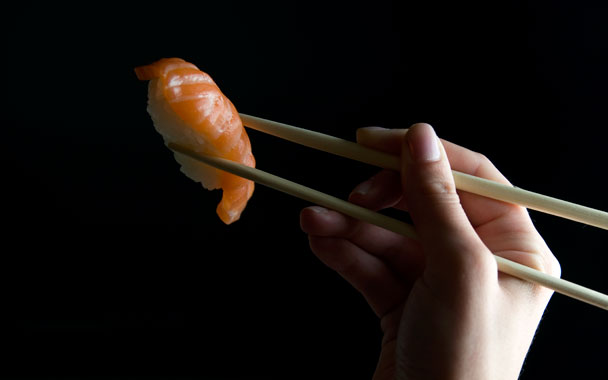Seafood chefs around the U.S. are paying a lot more attention to sustainability and the environment these days, but one group of fish-wielding chefs has yet to jump on the bandwagon: sushi chefs. Considering the vast quantities of tuna, salmon, shrimp, eel, and other creatures from the sea that Americans gobble down in the form of sushi, this is a major omission. What’s worse, the global sushi trade relies heavily on fishing and farming methods that damage ecosystems and leave particularly massive carbon footprints.
Activists and consumers are starting to take note. Last month, two New York City teenagers became minor celebrities when they exposed the false labeling of fish at Manhattan sushi restaurants for a science project. And just last week, Greenpeace activists exposed the sale of unlabeled Atlantic bluefin tuna at one of the London eateries of sushi superstar Nobu Matsuhisa—a problem because there is growing evidence that the fish are endangered. Melissa Kogut, executive director of the nonprofit Chefs Collaborative in Boston, talks with restaurateurs around the country to help them make more sustainable purchasing decisions, but she has yet to encounter sushi chefs who are proactive on the issue. “It’s crucial that more sushi industry folks have ocean-friendly seafood on their radar,” she told me.
While researching my book The Story of Sushi: An Unlikely Saga of Raw Fish and Rice, I found that one of the very few sushi operations that’s been ahead of the curve on the question of sustainability is a chain in the UK called Moshi Moshi. In Japanese the name means “hello?,” which is fitting since Moshi Moshi is, in a sense, giving sushi chefs everywhere a wake-up call. Headquartered in London, Moshi Moshi advertises an environmentally friendly philosophy, and runs several sushi bars where the menus feature a “Clear Conscience Set” (a combo platter composed of sustainable and locally produced ingredients). The managing director of Moshi Moshi is a woman named Caroline Bennett, whose own conscience became clouded back in 1998 when she discovered that bluefin tuna were in trouble. After investigating the plight of the bluefin, she decided simply to stop serving it.
Bennett started scrutinizing the other ingredients sold at Moshi Moshi, and the exercise changed the way she thought about the business. Rather than place all her orders through the international distribution system, in 2004 Bennett found a dayboat fisherman in nearby Cornwall who could supply her on a daily basis (more or less, depending on the weather) with high-quality local fish that weren’t endangered or industrially produced.



 Pinterest
Pinterest


